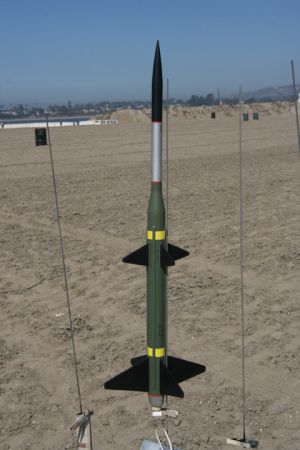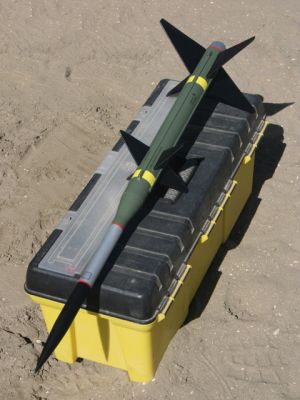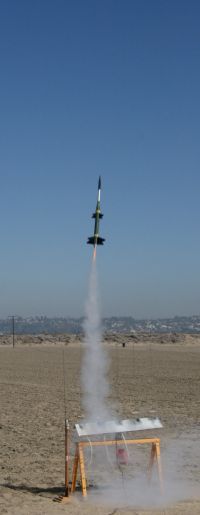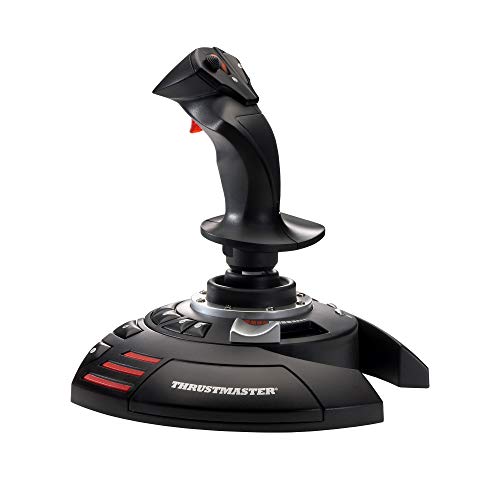Thrustline Aerospace Scorpion ATGW
Thrustline Aerospace - Scorpion ATGW {Kit}
Contributed by Todd Mullin
| Construction Rating: | starstarstarstarstar_border |
| Flight Rating: | starstarstarstarstar_border |
| Overall Rating: | starstarstarstarstar_border |
| Manufacturer: | Thrustline Aerospace |

Brief:
The Scorpion ATGW is a single staged, parachute recovery, military styled rocket. It is a fictitious shoulder-fired
anti-tank guided weapon.
Construction:
The parts list for the kit is:
- 1 BNC-50Y
- 1 9.5" BT-50 Payload Tube
- 1 4.5" BT-50 Engine Tube
- 1 TA5060 Balsa Transition
- 1 Laser Cut Fin Set (3/16" Balsa)
- 1 1/8" Launch Lug
- 1 Steel Eyelet
- 1 18" Kevlar® Cord
- 1 25" Elastic Shock Cord (1/8")
- 1 Baffle Kit for BT-60 (3 Ply Baffle Plates, Coupler Tube & Kevlar®)
- 4 16" Balsa Strips (1/4"x1/8")
- 2 BT-60 Tubes
- 3 CR5060F Centering Rings
- 1 CR5055F Centering Ring
- 1 CR2050P Centering Ring
- 1 Tail Shroud Pattern Sheet
- 1 18" Parachute Kit (I upgraded to the nylon 'chute)
- 1 Decal Sheet with instructions
- 1 3 page Instruction Booklet with illustrations plus supplemental sheets for the baffle kit and painting guide.
The components in this kit are very good quality as has come to be expected from all the Thrustline kits that I have built. The balsa cone and transition are well formed and firm. The laser cut fins are some of the nicest that I have ever seen! The tail shroud pattern sheet has 3 shrouds printed on it, just in case you goof on one (or two)! The parts all dry fit well with minimal sanding.
 The only thing that is a very minor con is that the outer layer on the body tubes had very
slight ripples in it. From previous kits, I know that these fill and sand down easily with a good coat of Kilz primer.
The only thing that is a very minor con is that the outer layer on the body tubes had very
slight ripples in it. From previous kits, I know that these fill and sand down easily with a good coat of Kilz primer.
The instructions are well written and easy to follow. There are illustrations for the steps that are a bit out of the norm from most rocket kits.
As usual, construction starts with the motor mount. What is different about this one is that you need four centering rings for it! One is placed at the nose end, one at the tail end, and two are sandwiched together in the middle to form a thicker ring. After the rings are adhered to the motor tube, it is installed into the end of one of the BT-60 tubes so that one of the sandwiched rings is inserted and one is hanging out. This ring and the one on the tail end of the motor mount are the supports for the tail shroud.
The next step if to assemble the baffle kit. The Kevlar® thread is inserted through the center of the forward plate and looped around a hardwood dowel. The plate is then glued into the coupler. Another plate is glued in the center of the coupler and a final one at the tail end. The coupler/baffle is then installed between the two lengths of BT-60, with the Kevlar® loop facing forward.
Next, you need to decide if you are ever going to fly a payload in your Scorpion. I decided that I didn't want to be able to access the payload bay, so I glued the balsa transition and the nosecone permanently into the BT-50. You can always either friction fit them or use a set screw.
The paper tail shroud pattern is cut out of the pattern sheet and looped together. The shroud sizing is just about the best I've ever seen in a kit. It fit perfectly the first time without any stretching or sanding needed. Just another example of the little details that Thrustline has worked out in their kits!
After the tail cone, it's time to cut out and glue on the fins and strakes. The laser cutting on the fins is top notch. On my set of fins they were cut cleanly without an excess of charing on the wood. The fins were held in place by the tiniest slivers of balsa and they fell free once the attachment points were cut. After just completing several kits with either cut 'em yourself and badly laser cut fins, these were a pleasure to work with.
I use a combination of yellow glue and CA for my fins. A bead of yellow glue in the center and a dot of medium CA on each end. This helps get the fin bonded in the correct position quickly and allows for good bond strength as the yellow glue cures. I used the method suggested in this EMRR featured tip to get the fins aligned properly with each other.
The only thing that comes close to a gotcha in this kit is the strakes. You have to be careful in their placement. After sanding and shaping them, they are bonded onto the lower section of airframe. You need to center the wide balsa strip on a thin pencil line by eyeballing it. If you aren't paying attention, they could easily go on crooked.
The last pre-finishing step is to add the launch lugs. These are cut at 45 degree angles and glued to the top of one of the strakes, even with the ends which had been sanded to a 45 degree angle previously. I normally try to hide my lugs as much as possible, but this placement is very reminiscent of the attachment points on the real Hellfire missile.
After finishing, I added in the recovery system. I upgraded to the nylon parachute from the basic mylar one. I have had problems with mylar in the past from other companies, so I'm a little leery about using it for anything other than competition models.
Finishing:
There are no real special requirements for finishing the Scorpion, just large vats of wood filler and elbow grease.
There is a lot of lumber and tubing on this rocket to fill and sand. I used a coat of Elmer's Fill 'n' Finish and then
a coat of Kilz primer to give the fins and tubes a nice, smooth finish. The balsa was fairly tightly grained and didn't
take any extra filling to complete.
Thrustline includes a sheet with their suggested paint scheme in color. I decided to change a few of the colors around a bit but still keep the flavor of their original. Thrustline points out on their pattern sheet that you should customize their paint and decal scheme to your own tastes!
The kit comes with a 5 x 8.5" sheet of military style decals, including logos, serial numbers, and stripes. The decals are printed by Excelsior Rocketry, who print some of the nicest decals I have used on rockets. I decided to use some of the decals and some pinstriping tape that I had to give the Scorpion my version of the finish. After this, I sprayed the entire model with Testor's Dullcote. The decal instructions specifically say not to use Krylon clear coat.
Construction Rating: 4 out of 5

Flight:
For my test flights, I loaded the recommended D12-5 engines. As there is no motor hook, I added a couple of wraps of
masking tape on each flight and clear taped a motor spacer onto the front of the motor since the motor block is sized
for Estes E length motors.
I decided to go for broke with the baffle and not use any wadding. Thrustline recommends using some and backing off how much you use as a precaution at least with the mylar chutes.
The Scorpion lifted off the pad somewhat slowly and corkscrewed lazily into the sky. I must have the forward fins just a tiny bit off kilter from the corkscrew trail, though with fins toward the front of the rocket, this is not an unusual flight profile.
I made three flights, each with progressively more breeze. Even with a 3-5 mph breeze, the rocket did not weathercock badly. The third flight was launched at about a 10-15 degree tilt into the wind off the pad, but the Scorpion corrected once airborne and flew it's slow corkscrew nearly vertically.
Recovery:
An Estes D12-5 is exactly the right delay for this kit. On a windier day, I might have reefed the 18" chute, but
it brought the flight to a gentle end in the light breeze today.
As with all of the Kevlar® cords that I'm using for recovery now, I used 3-4 wraps of masking tape even with the end of the tube to prevent zippering. This is a really simple solution to the terrible zippers that I used to get from Kevlar® thread.
Thrustline's baffle system works like a charm! There was no scorching of the chute. After three flights it looks like it was fresh out of it's plastic bag. I've been leery about baffles in the past and tended to use "dog barf" or Nomex®, but this one works great!
Flight Rating: 4 out of 5
Summary:
I am a huge fan of Thrustline's kits. They produce some of the most original and interesting kits on the market. The
Scorpion is no exception. The kits are obviously designed by someone who has flown a lot of rockets and knows what a
builder is looking for in a kit. Excellent quality balsa, sturdy tubes, Kevlar®
recovery harness, properly sized tail cone patterns mean lots of fun!
Before releasing the kit, John from Thrustline even ran a contest to decide on the name of the kit on The Rocketry Forum. My suggestions didn't win, but John combined two others to come up with Scorpion ATGW. Listening to real rocketeer beta test feedback and involving the rocketry community in the process of creating a kit like this is outstanding!
If you want to build a rocket that gives you the look of a real missile, I'd highly recommend the Scorpion. It's a great flier and the baffle system makes reloading and getting it back in the air a snap!
I got several compliments on the rocket today from other fliers who liked it's military lines. Even though one was that it looked more like a bunker buster than an anti-tank missile, it brought smiles to the faces of those who saw it.
Overall Rating: 4 out of 5
 |
 |
Flights
Sponsored Ads
 |
 |











